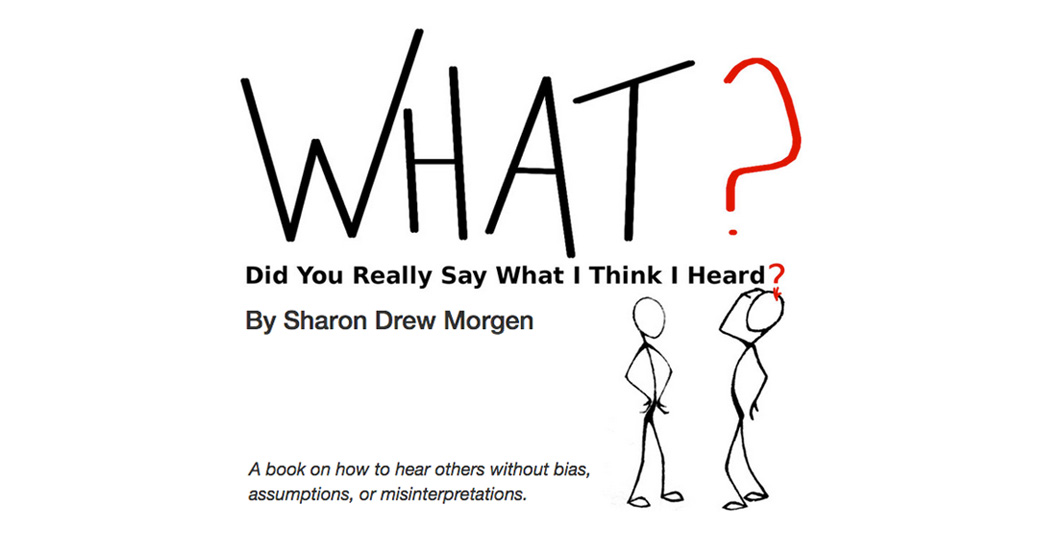Anatomy of a Lost Sale: Case Study
 I’ve been writing a lot lately about how we lose sales and forego success because we enter and conduct conversations through our biases and assumptions. Here is recent dialogue with a potential partner that gives a terrific example of possibility lost.
I’ve been writing a lot lately about how we lose sales and forego success because we enter and conduct conversations through our biases and assumptions. Here is recent dialogue with a potential partner that gives a terrific example of possibility lost.
The representative of a sales/marketing blog called to discuss republishing my articles. Sounds great, right? But the hidden agendas, assumptions, and lack of collaboration ruined what might have been possible.
Here’s the story – and I’ll call my Communication Partner Bill.
DIALOGUE
Bill: Hey Sharon Drew. We love your content and would love to make it available to our 100,000 readers. Are you interested?
SDM: Sure. But I notice you’re a ‘sales’ blog, and my stuff is not exactly sales. Do you know the difference between Buying Facilitation® and sales?
Bill: I’d like to say yes, but I probably don’t.
SDM: Should I explain it? And if you still like what I’m doing we could see if your readers would like it too.
I then proceeded to explain my change facilitation model.
Bill: I hadn’t known all that. Good stuff. So we can repurpose your articles, and then you can use social media to link back to us?
SDM: What do you mean, Repurpose?
Bill: I just sent you links to 5 articles we’ve already repurposed so you can see. We reserve the right to change 25% of our contributor’s articles to enhance Search capability. Take a look. We haven’t published them yet and are awaiting your approval.
SDM: Wait. You want to rewrite one quarter of what I’ve written, possibly without fully understanding what I’m saying, and then use my name as the author? How do you know what you’ve changed imparts the same message?
Bill: Well, we hope we get it right.
SDM: You hope? So you rewrote some of my article to suit your needs, didn’t ask me to do it myself so it would line up with my intended message, didn’t understand Buying Facilitation® before you changed it, and spent hours rewriting my stuff before getting my approval – and still want me to have my name on stuff I didn’t write so your site can align with my brand?
Bill: Well, yes. But we have 100,000 readers that you’d then have access to.
SDM: Do you know how long those articles take me to write?
Bill: No idea. A couple of hours?
SDM: 10-20 hours. I’m a writer! Each word is carefully chosen to mean exactly what I want it to mean; a specific flow that I carefully create. No one – no one – touches my articles! Even my editor just writes me notes, like ‘Too wordy’ or ‘This is in the wrong place.’ And you want to rewrite 25% of my articles? And you were so sure that I’d be ok with this that you already rewrote 5 articles? That’s quite an assumption, not to mention time waste.
Bill: We didn’t mean to annoy you. Other bloggers are happy to have 100,000 eyeballs reading their stuff.
SDM: My blogs have plenty of eyeballs. But that’s not the point: why would I put my name on something I didn’t write and may not represent my thinking accurately? I find your assumptions infuriating and arrogant.
Bill: How ‘bout if instead you just share links to some of our articles with your social media connections?
SDM: The mainstream reader isn’t my audience. Did you know that? Did you ask who my readers were?
Bill: Oh. I didn’t know that. How ‘bout if you wrote an article just for us?
SDM: Sure. Any thoughts on how you might compensate me for my time and ideas?
Bill: We can’t pay you.
SDM: If you think of any way to compensate me, let me know.
Bill entered the call with biased expectations and assumptions based on his needs – access to my readers and the use of my name and content. His assumptions absolutely infuriated me, stepped on my beliefs, my ego, my professionalism, my time/hard work/ideas. I felt disrespected, abused, and annoyed that he merely wanted to meet his own goals, hadn’t done his homework, and assumed that his ‘product’ (100,000 eyeballs) met my criteria of a ‘win’ (It didn’t.). Unethical and out of integrity. If he had entered by assuming that between us we’d find a ‘win’ we could have found a way to serve us both.
A DIALOGUE USING BUYING FACILITATION®
Sellers lose sales when entering with biased, self-serving assumptions that limit possibility. Conversations that might have proved fruitful end up inadvertently annoying buyers, miss real prospects, and only connect with those having the same assumptions and biases. Here is what the conversation, and a partnership, could have been using Buying Facilitation® (and a bit of homework).
Bill: Hey Sharon Drew. I’m calling from X blog, and we love your stuff. I wonder if there is a way we could share your ideas with our readers in a way that would enable Google search for us both? From reading some of your articles, it seems that your target audience are early adopters and we might have some in our database.
SDM: Cool beans. Thanks for the call. How do you generally enhance search capabilities in your author’s articles?
Bill: We change about 25% of the content to use the most productive search terms. We might have to discuss if the same terms work for you also. How would you know, before we begin, that it’s possible to add search terms that could maintain the integrity of your message while effectively reaching the right audience?
SDM: As a professional writer, I don’t allow anyone to touch my writing. But I’d be happy to discuss search terms that would work for us both, and add them into the article. Does that work?
Bill: I’m sure between us we could find the right words. Worth a try. Another thought: maybe you could write an article for us? Since we couldn’t pay you money, do you have some ideas about something we could do together to make it a win for both our readerships?
By entering with the goal of win/win, by entering without self-serving assumptions that biased the entire conversation, we could have found a creative win for both of our readerships.
I don’t know what might have been. Maybe we could have created the largest sales blog in the world together. Or co-authored a book on the arc of the past and future of sales. Maybe we could have started a podcast series and invited disparate professionals to speak. Maybe. But we’ll never know. And that, my friends, is how you lose sale.
____________
Sharon Drew Morgen is the author most recently of What? Did you really say what I think I heard? as well as self-learning tools and an on-line team learning program – designed to both assess listening impediments and encourage the appropriate skills to accurately hear what others convey.
Sharon Drew is also the author of the NYTimes Business Bestseller ‘Selling with Integrity’ and 7 other books on how decisions get made, how change happens in systems, and how buyers buy. She is the developer of Buying Facilitation® a facilitation tool for sellers, coaches, and managers to help others determine their best decisions and enable excellence. Her award winning blog
sharondrewmorgen.com has 1500 articles that help sellers hep buyers buy. Sharon Drew recently developed 3 new programs for start ups.
She can be reached at sharondrew@
Sharon Drew Morgen May 2nd, 2016
Posted In: Communication, News

